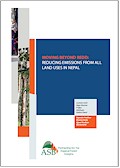| Report |
 |
|
| Title | Moving Beyond REDD: Reducing Emissions from All Land Uses in Nepal | | Author | Laxman Joshi, Naya Sharma Paudel, Hemanta Ojha, Dil Bahadur Khatri, Keshav Kanel, Rajendra Pradhan, Bhaskar Karky, Ujjwal Pradhan and Seema Karki | | Year | 2010 | | Institution | World Agroforestry Centre - ICRAF, SEA Regional Office | | City | Bogor, Indonesia | | Number of Pages | 88 | | Call Number | RP0266-10 |
|
| Abstract: |
Nepal's stake in reducing rmissions from deforestation and forest degradation (REDD) is
high owing to its vulnerability to both climate variability and any mitigation strategies
aimed at reducing emission through forest conservation. Because of its natural
resource-based economy, REDD and similar mechanisms will have huge implications in
Nepal (potential benefits and risks). Since the large population relies heavily on natural
resources, where strategies for mitigation and adaptation overlap, REDD and similar
mechanisms must fall within the broader framework of adaptation. Existing frameworks
must be broadened in order to benefit the Nepalese people: rather than focussing
narrowly on additionality for carbon financing, overall enhancement of forest must be
taken into account. The criteria of permanence and no leakage are also difficult to meet,
looking at the dynamic economic and livelihoods contexts that affect the values and
choices of local people dependent on forest.
Considering these conditions, Nepal would not benefit from REDD alone and therefore
should be lobbying for REDD+, which includes enhancing carbon stocks, and even
REDD++ which looks at carbon in all land uses. A critical issue is that since millions of
small farmers and other rural inhabitants interact with land in a variety of ways for
multiple objectives, a simple distinction of 'forest' or 'non-forest' has little relevance. The attempt is for payments for sustainable land use with productive conservation where net biological productivity will be enhanced, while also allowing flexibility for local
forest owners to adapt to changing conditions affecting needs, preferences and values.
There are limitations to a sole focus on forest-based mitigation approaches such as
REDD and hence the proposition of a broader concept of reducing emissions from all
land uses (REALU). The narrow focus on forest-based REDD omits agriculture and
therefore misses huge opportunities. Similarly, it fails to address many technical issues,
such as leakage and permanence, and so would be unable to effectively curb emissions
in the long term. A more comprehensive approach including all land uses will minimise
technical errors and effectively reduce emissions. This report attempts to resolve the
apparent dichotomy between adaptation and mitigation by highlighting how
sustainable resources management simultaneously reduces emissions, enhances food
security and increases ecosystem resilience. The mosaic of farm and forests and
traditional integrated farming provides a unique context where mitigation and
adaptation go together. |
|
|
Download file(s): Click icon to download/open file.
|
| |
File Size |
Description |

|
1,748 KB |
Softcopy |
|
|
|
| Viewed in 2695 times. Downloaded in 941 times. |